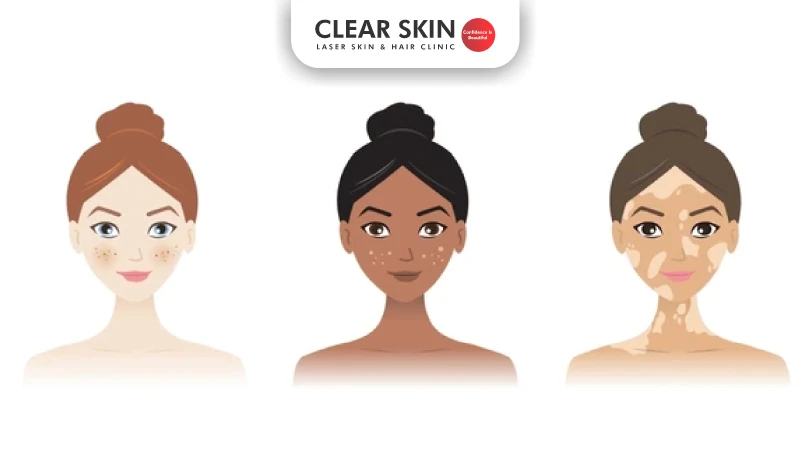Reviewed By:
Category: Skin Pigmentation
All of us wish to have good and flawless skin, with no single spots on the skin. Skin pigmentation is nothing but called as decoloration of skin. The reason behind pigmentation is not completely known, but it is said to occur due to sun exposure. The other reasons such as hormonal changes, medications, skin products etc can also be the reason for pigmentation.

Table Of Content
- What are the Types of Skin Pigmentation?
- When to Consult a Dermatologist?
- Conclusion
What are the Types of Skin Pigmentation?
Melanin is the pigment which is seen in many organisms which give us the color to our body. When melanin pigment increase in the body the skin looks darker and less production then the skin looks lighter. This pigment gives color to the skin, hairs, and eyes.
Let’s talk about the pigmentation and its effects on the skin:
- Make our face to look dull.
- Makes our skin to look uneven tone.
- Skin looks always tired.
- Makes our skin look older your age.
- Looks like dark spots.
Let’s talk about the types of pigmentation:
- Freckles: these are the flat brown spots seen mostly in the face of both men and women.
- Melasma: It can happen due to hormonal changes, it looks like a butterfly patch on the face, can be seen in both males as well as females.
- Hyperpigmentation: It is the condition which is harmless but it is seen when the content of the melanin production increases and makes the skin looks darker.
- Age spots or liver spots: it looks like flat tan and brown spots and can be seen in both the gender.
- Sunspot: they vary in size and can be seen in face, hands, and legs also.
Let’s discuss the home remedies:
- Apple Cider Vinegar: Dilute with water and apply on the spot, which gives very effective results.
- Alovera gel: Apply raw aloe vera and leave it for 10 to 20 mins and repeat the treatment twice a week.
- Green tea: Application f green tea on the pigmentation marks.
- Milk: Sock the cotton balls on the milk and apply on the spots and repeat this treatment twice a week.
Let’s talk about clinical treatment:
- Laser treatment: Co2 and Q switch laser works well on the spots and targets each and every cell.
- Chemical peeling: Application of peeling and the leave it for 2 to 3 mins depending on the skin condition.
- Medications: follow the treatment medications which given by dermatologist.
It’s very important to start using medications with dermatologist concern only and then in case you wanted to stop or discontinue the medications it’s important to inform your doctor to get a good result. With medications, it’s always important to use sunblock also to get better results. Sunblock helps in protecting your skin from sun rays.
When to Consult a Dermatologist?
Conclusion
Popular Q&As
If you’re dealing with black scars on your legs, it’s likely due to conditions like folliculitis caused by ingrown hairs from waxing. Laser hair removal offers a permanent solution by destroying hair follicles, reducing future ingrown hairs. Curious about acne treatment costs in Pune? Learn about laser treatments, session prices, influencing factors, and insurance tips. Do you know what causes pimples on the chest and back? Click to Know more
How to Remove Black Scars on legs?
Unlocking the Secrets of Acne Treatment Costs in Pune: Your Go-To Guide!
Understanding and Managing Chest and Back Acne
We Got Your Back! Ask Us Anything On Your Mind!
Reach out to us on
Didn’t Find What You Were Looking?
Please Contact Us.
We are committed not only to treating you, but also educating you.

